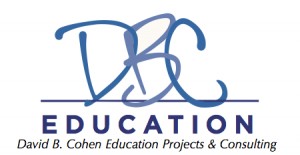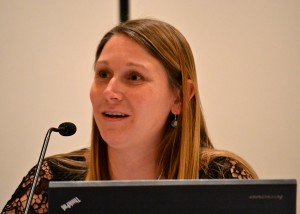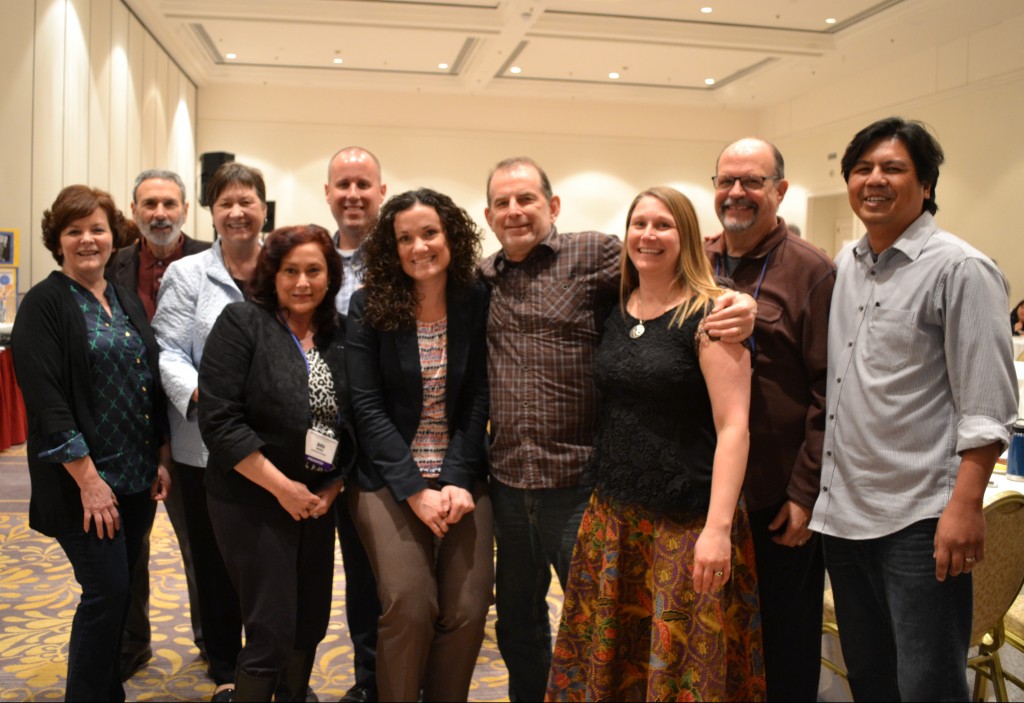I’m grateful to Tara Nuth Kajtaniak for sharing her writing to form the core of this blog post. Here’s the context for her remarks.
On February 6, 2015, I had the great privilege to attend the Teacher Innovation Expo, a pre-conference session at the Good Teaching Conference put on by the California Teachers Association. The Expo was put on by the CTA’s Institute for Teaching, the non-profit arm of CTA, promoting teacher-driven change that strengthens teaching, schools, and communities.
I’ve been involved in regional “think tank” projects sponsored by the IFT for several years, and through this involvement I’ve had a chance to see how our state union can be a vehicle to bring teachers together around creative ideas the help our profession by helping improve what happens in schools. But the work of think tanks mostly occurs outside of schools. The IFT reaches directly into schools through a grant program that, since 2010, has distributed $1.2 million to support the ideas of teachers with ideas to improve their teaching and schools. At a time when teachers unions are too often seen as obstacles to school improvement, this grant program provides a powerful counter-narrative. I already knew about much of the fine work supported by these grants, and yet I was still blown away by the presenters who described how their union-based grants spurred partnerships among teachers, administrators, parents, businesses, community organizations and universities.
Here are Tara’s remarks from the closing of the Expo, with a short description based on each of the presentations. (If anyone can provide additional links relating to the projects, please add those links in the comments – thanks!).
What we saw today:
Anna Mumford’s Green Garden Project, where a Pinterest idea becomes a school garden and her IFT grant becomes a catalyst for community donations.
Joel Sebastian, Sarah Morgan, and Rich Sandoval’s Oral History Project and Summer History Institute get kids living history and collaborating with their community.
Deepika Srivastava inspires a love of math among both students and parents through the Moreno Valley Math League, the STEM symposium, and the Day of Coding.
Camie Walker connects her young engineers to the people of Haiti and enables them to problem-solve about Haiti’s housing issues.
Through the Riverside Trolley Dance Project, Nicole Robinson creates a culture of responsibility through empowering students to choreograph, plan, and execute public trolley dances. (see Robinson’s Prezi slides).
Bonnie Magill’s Marysville FFA [Future Farmers of America] students go into elementary schools and into the community to teach agricultural literacy.
Adriana Perez and Kelly Iwamoto help close the achievement gap in Inglewood through the incredibly inspiring Parent University.
Kory Bootsma brings hand-on, project-based learning to her science/ag classroom through hydroponics and aquaponics and organic farming.
Ashley Cooper shares her passion for professional capital and teacher leadership all over the state.
Cristina Buss and Marlaina Schroeder are powerhouse-teachers who got their district to change their bus schedule so that they could implement an Academic Outreach Program that prevents students from slipping through the cracks.
Brian Bartlett’s Sculpting the Future program gets kids to work hands-on with tools and learn safety while expressing themselves through sculpture art.
Beverly Bricker partnered with CABE [California Association of Bilingual Educators] to empower her bilingual parents to educate and support their communities.
What does it mean: All of these projects are future-oriented, student-centered, teacher-driven, and transforming their communities. Teachers have the capacity to innovate their practice and profession to connect communities with their classrooms in engaging ways, and the California Teachers Association’s Institute for Teaching has trusted teachers, funded teachers, and allowed these teachers to make tremendous impacts on their schools and communities.
What we need to do from here?
We need to think about the things that we saw, and take those things in, and think about ways we can bring innovation to our communities and schools. The important thing is that we continue to engage teachers, to drive the conversation that is happening in our profession, so that we can reclaim our profession and reclaim the community, and share the spark with people that we work with every day.
Thank You:
- All the IFT think tanks for bringing colleagues to this event and supporting this idea
- South Bay Think tank for getting up early and helping us with logistics
- David Cohen for working on the press release
- Our Think Tank Facilitators: Yale Wishnik, Margaret Wallace, Steve DePue, and our very own Sheila Bell
- IFT Grant Selection committee members who served on the panel: Liane Cismowski, Barry Wissman, Dick Gale
- IFT Board of Directors
- Merri Boston, Dick Gale, and Anita Benitas for all of the work they have done to make this happen
I would like to send out a very, very special thanks to the East Bay IFT Think Tank members for the conversations and planning that went into it. Charles Shannon and Erika McGuire, your attention to detail and logistical planning was instrumental. Mike Willmarth and Sheila Bell, thank you for keeping us focused on the prize, and Eric Enriquez for your big ideas and compelling questions.



One thought on “Teacher Driven Change on Display at Innovation Expo”